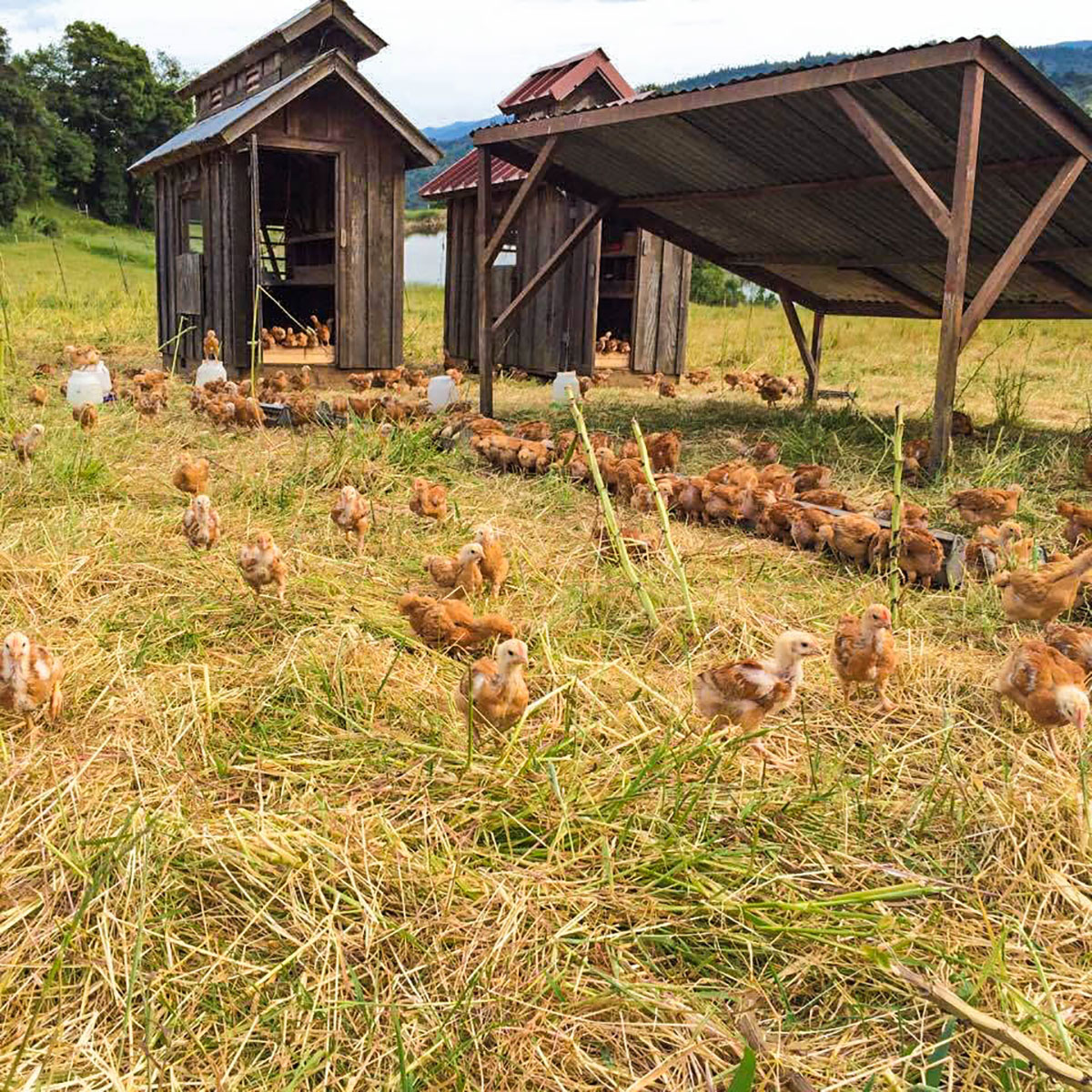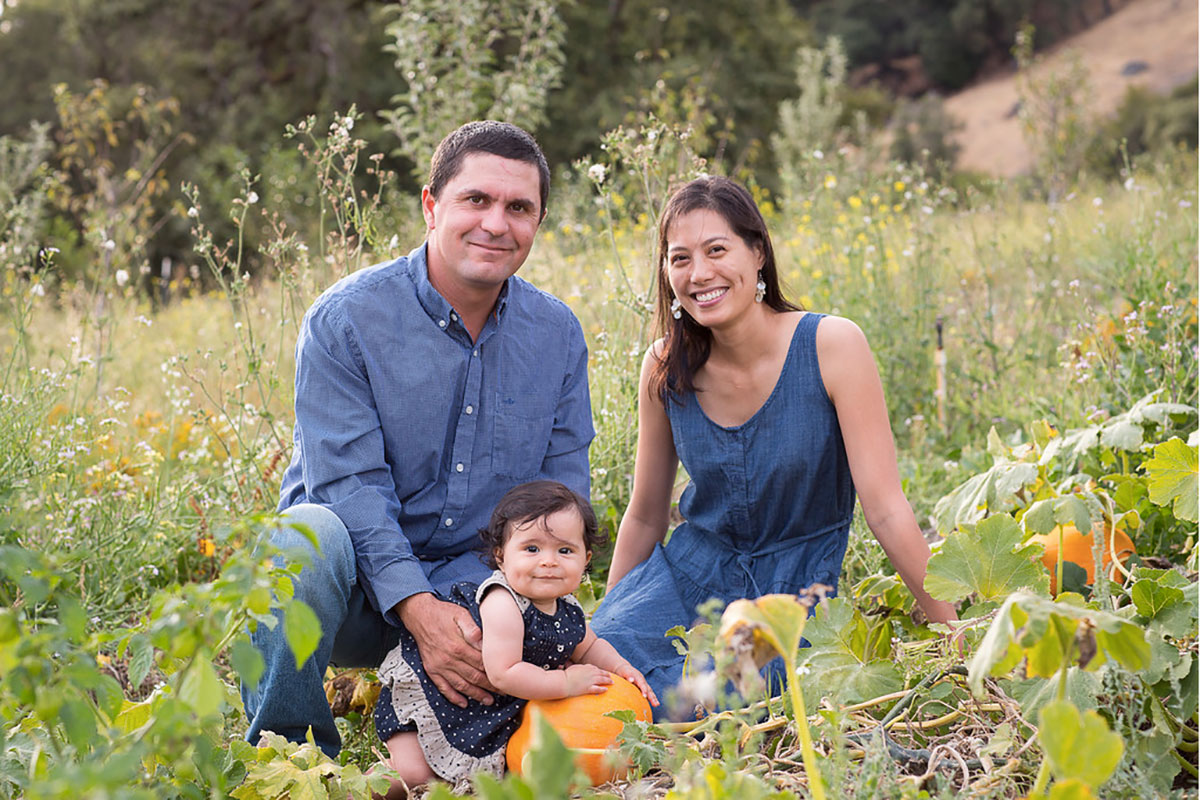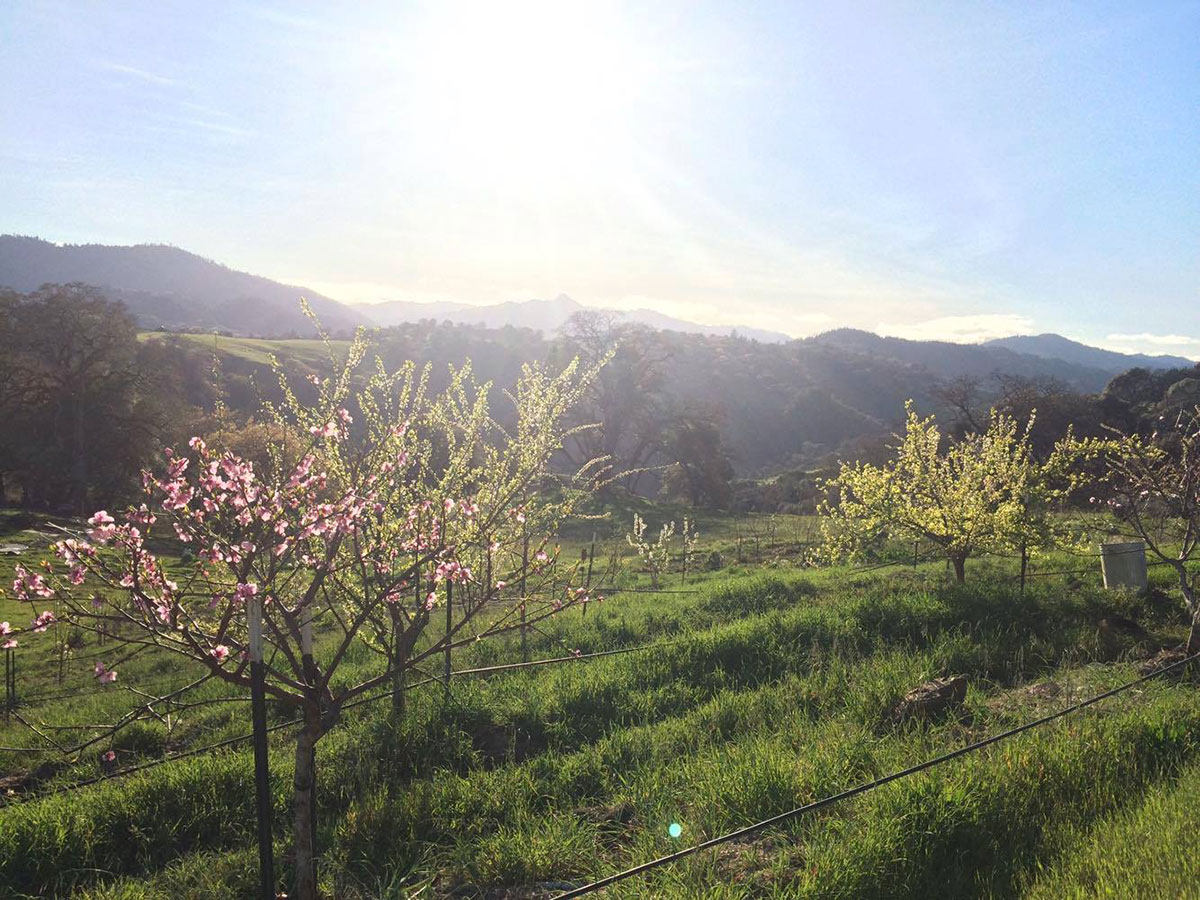Mendocino Meats in Redwood Valley

story & photos by Paula Gaska
Since establishing Mendocino Organics / Mendocino Meats in 2000, our farm has evolved to where we currently focus on meat production— heritage pastured pork and pastured chicken, along with lamb, goat, beef, and eggs. Farming is an adventure as we work with the natural environment and processes to produce food.
Like any small business, we deal with changes in the market and are directly impacted by supporting industries. The trials and opportunities have been varied along the way as we pursue our passion for delicious, healthy food.
Focusing on raising livestock is different from raising crops for a living. We hold a higher level of responsibility to honor the life of the animals who feed us, and livestock require a specific land base and infrastructure. Food safety laws regulating the logistics of getting your meat to market are also unique and expensive. We are required to process meat at USDA-inspected facilities to sell to our chosen buyers. Fortunately, we are able to navigate the system and make it work, cooperating with other local ranchers.
Like many first-generation farmers, we had to find land and capital to establish our venture. In summer 2008, we began a partnership with Julie and Joe Golden of Golden Vineyards at Heart Arrow Ranch, overlooking Redwood Valley, with the purpose of bringing more crop and livestock diversity to their biodynamic farm. In exchange for assisting Golden Vineyards in managing the soil fertility and overall plant health of their certified organic and Biodynamic® wine grapes and olives, we have the opportunity to complete the farm organism by growing mixed vegetables, herbs, fruit, and hay, and raising livestock. Our two businesses are working together toward a self-sustaining farmscape. CSA-style marketing and small business loans from community members who believe in our vision and mission have helped us capitalize our farm. Small grant programs, such as those offered through the USDA Natural Resource Conservation Service (NRCS), and online crowd-funded loans from Kiva Zip have helped us gradually grow.
Finding our niche and making available affordable healthy meat is hard in Northern California, where we compete with medium-scale meat producers who also produce good, consistent products in a sustainable manner. We aim to scale our operation to be price-competitive and to develop a distinct product, truly unique to our farm. Thus, we have invested in livestock breeds adapted to Heart Arrow Ranch and to a pasture-based lifestyle, and we find cost-effective quality feed and forage. For example, our pig breeding herd of three boars and 20 sows consists of many old breeds, including Berkshire, Red Wattle, Mulefoot, Eurasian, and others. With these genetics, the pigs can thrive on the sloped oak woodlands of Heart Arrow Ranch as well as the summer pasture we lease near Ukiah. For pig feed, we have developed a proprietary blend of non-GMO, soy- and corn-free feed, which includes spent brewery grains and food manufacturing byproduct, most of which is certified organic. These elements yield a sweet, well-marbled, and very flavorful meat.
In the summer of 2017, Julie and Joe Golden opened SIP and SAVOR at The Golden Pig in Hopland to showcase our products and offer the community local, farm-driven food. The bar and restaurant is “working with farmers, ranchers, gardeners, brewers and winemakers to provide an authentic small-town, local dining experience with recipes to SIP and SAVOR, leaving each guest feeling better than when they entered” (www.thegoldenpig.com). The restaurant sources as much meat, eggs, and produce as possible from Heart Arrow Ranch and works with other local producers, such as Magruder Ranch in Potter Valley for grass-fed beef, and Pamela’s Products for gluten-free mixes.
Selling competitively priced sustainable meat is challenging, whether to restaurants, butcher shops, or grocery stores, where most people purchase their food. The Golden Pig purchases whole animals, creating a win-win for the bottom line of the restaurant and the rancher. To do so, the restaurant needs to utilize the entire animal, meaning nothing goes to waste, and food costs are minimized. Restaurants may not be able to utilize whole animals because they are menu-driven and do not need all the cuts, or they may lack the space or labor to breakdown whole or half carcasses. As a rancher, selling whole or half animals is easier because we save on paying for additional processing of the meat, and we save time and energy securing buyers for all cuts of the animal.
With menu items like The Golden Pig signature sandwich— pork hot dog with pulled pork and sauerkraut on a pretzel roll—the Reuben sandwich, and rotisserie chicken, the restaurant showcases high-quality, local ingredients in a friendly format of comfort food. The local food movement does not have to be overly expensive, and we can meet people with an approachable menu.
It has been important for our farm to stay in diversified production to help us weather natural and market-based challenges. From 2008 to 2013, our organic vegetable CSA was actually our main focus. By 2015, we reduced the number of our grazing animals as a reaction to the drought and expanded pork production as opportunities opened in that enterprise. As a local food producer, we strive to be consistent, trying to achieve an economy of scale yet remaining open and flexible enough to recognize opportunities or the need to change.
In 2017, the Grade Fire and the Redwood Complex Fire raged through Heart Arrow Ranch. Only roughly 200 acres of the ranch’s 2,000 acres did not burn. We were able to save all livestock, equipment, and structures, including the Goldens’ home. Hopefully, we can leverage the fire’s destruction as an opportunity to expand our grazing animal operation again
We can develop access to more grazing land at Heart Arrow Ranch and perhaps even open up more emergency exits from Redwood Valley. We are grateful for how supportive the community has been in our farming venture thus far, and we hope to continue supporting the community with wholesome food and more.
Paula Gaska owns and operates Mendocino Meats with her husband Adam in Redwood Valley, CA. After working in Washington, D.C. as a conservation economist in her early 20s, Paula found her true passion for sustainable agriculture and food in Northern California. Family photo © Emily Matheson. All other photos courtesy of Mendocino Meats.



